Was ITV's The Nightly Show a success?
- Published
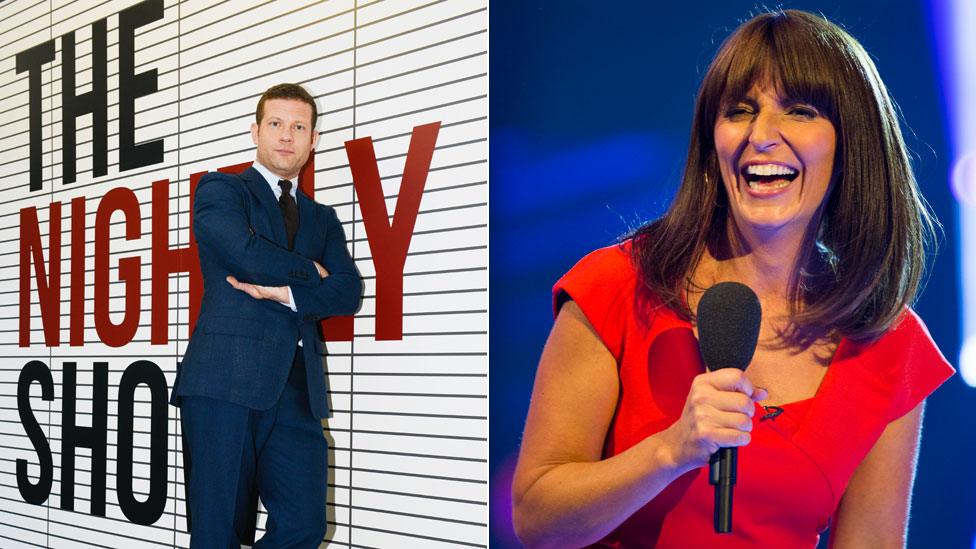
Dermot O'Leary and Davina McCall were among the hosts
ITV's The Nightly Show didn't get off to the strongest start - but its fortunes improved over its eight-week run.
The first series of the new entertainment show drew to a close on Friday after 40 episodes.
It was broadcast every weeknight in the 10pm slot normally occupied by the news, and saw a different celebrity take over presenting duties each week.
The show struggled at the beginning - viewing figures quickly dropped after the first episode hosted by David Walliams and critics weren't too keen on it either, external.
But things improved as the series progressed, with the show gradually building an online audience and some presenters proving particularly popular with viewers.
An ITV spokesman said: "ITV is doing better than any other terrestrial channel this year in terms of year-on-year performance, we've had a really strong start to the year.
"We're in a strong position to try some new things and experiment, it is imperative we try new things, which have the potential to enhance our entertainment offering."
Let's take look back over The Nightly Show's first season.

The hosts
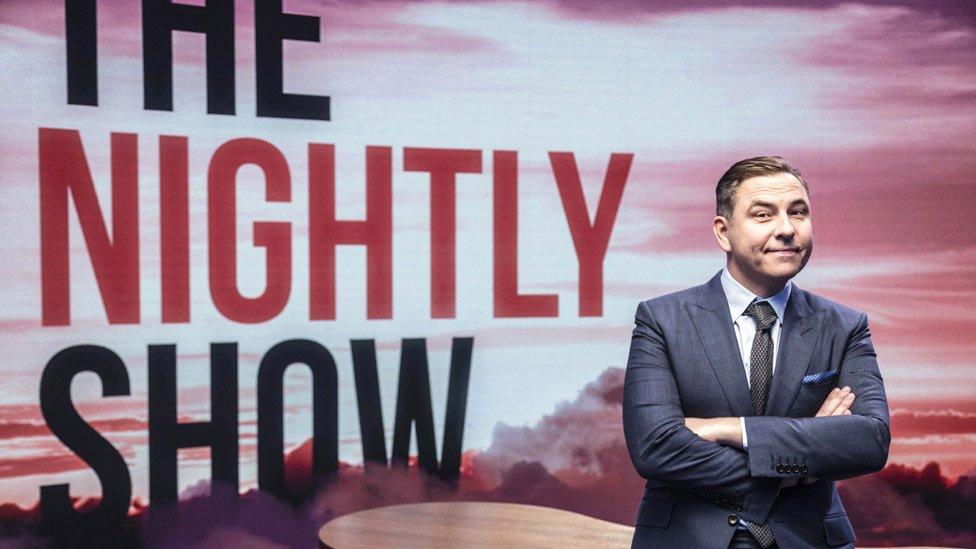
David Walliams was the first of The Nightly Show's guest presenters
David Walliams was on hosting duties for The Nightly Show's first week - and helped the series start strongly with an average of 2.9 million live viewers tuning in for its opening episode.
But his performance received negative reviews, external from critics and the audience dropped to 1.2 million by Friday's programme.
"I think David Walliams just isn't a natural presenter, and it really came across," says Frances Taylor, TV critic for the Radio Times, external.
"He's a great actor and comedian but we'd never seen him at the helm of a programme, and if you're going to have revolving hosts you've got to have someone strong to kick it off.
"If you don't, viewers will lose interest, and once they've gone, it's difficult to get them back."
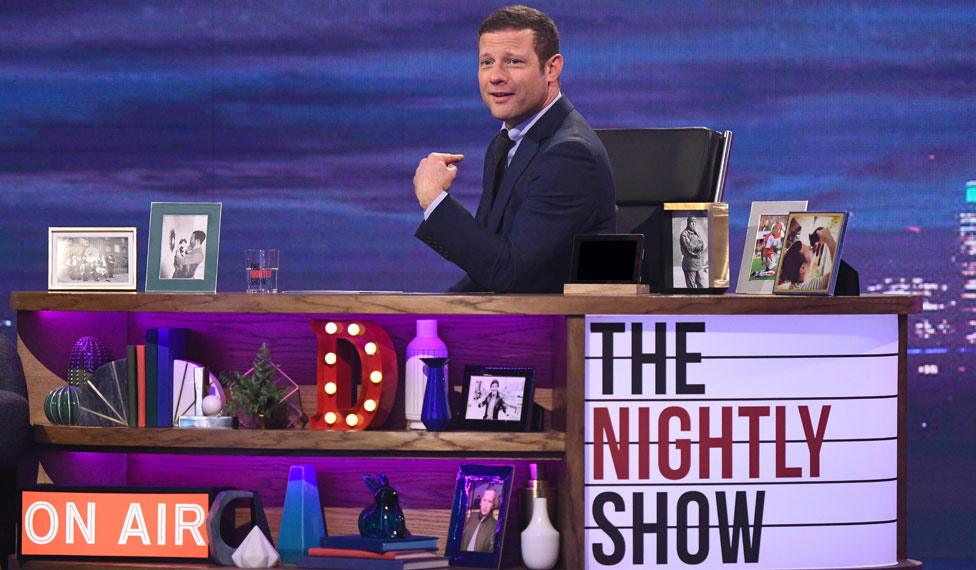
Dermot O'Leary was one of the most popular presenters with viewers
Walliams put the viewing figures and poor reviews down to people being annoyed about the News at Ten being moved back by half an hour in the schedules.
After his stint, John Bishop, Davina McCall, Dermot O'Leary, Gordon Ramsay, Bradley Walsh and Jason Manford all had a turn.
Some presenters were more popular with viewers and critics - particularly O'Leary, who was booked for a second week later in the run.
Ramsay proved a successful booking too, and he helped the show build a stronger online following, partly due to the star guests he drew to the show.

Celebrity guests

Several of Gordon Ramsay's segments went viral, such as musician John Legend's comic take on Ramsay's sweary language
UK chat show hosts such as Graham Norton, Alan Carr and Jonathan Ross regularly attract high-profile guests, but their shows only air once a week.
When you've got five nights of shows to fill, talent booking is a greater challenge, especially outside the US, says author, lecturer and television executive Lyndsay Duthie.
"In the US, you've got A-list guests night after night because there's a bigger talent pool to draw from," she says.
"James Corden has Madonna and Michelle Obama taking part in Carpool Karaoke, which makes it not only entertaining, you can't believe the talent they've got on there."

The Nightly Show struggled a little on this front - but it did manage to attract some big names as it went on, particularly the week Ramsay was in charge.
"The stuff Gordon Ramsay did with John Legend has got such global appeal because they're such big stars in America," says Frances Taylor.
In one segment, which was a hit, Legend was seen at a piano, singing some of the foul-mouthed chef's most famous TV insults.
"If you've got names like that then people all round the world will recognise them, and that means that it probably will go viral, and that's the whole point of shows like this," Taylor adds.
"Bradley Walsh interviewing Louise Redknapp didn't have quite the same worldwide appeal."

Topical segments
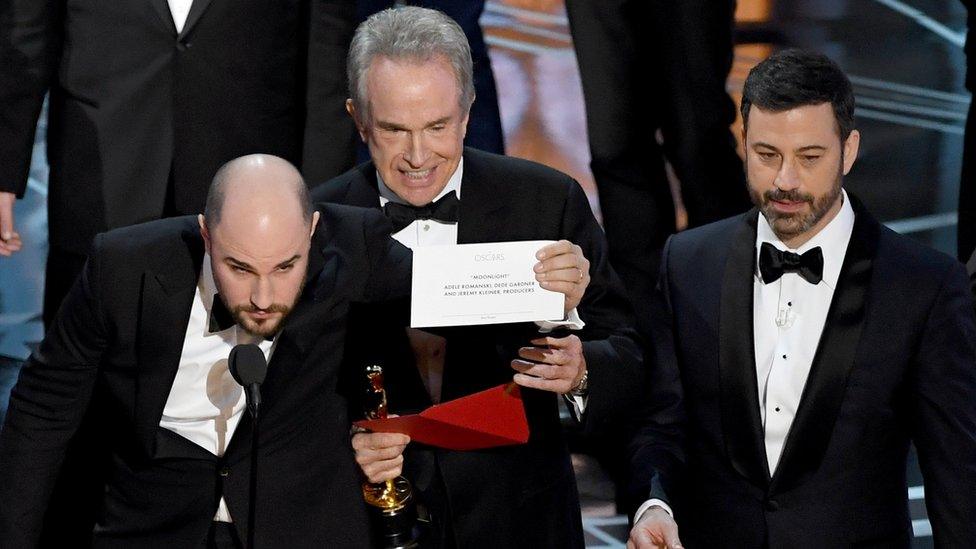
The Oscars mix-up occurred the evening before The Nightly Show launched
One of the benefits of producing a show which is recorded on the same day it's broadcast is the writers' ability to put in jokes about the day's news events.
Taylor says: "A show like this lives and dies by the writing, and The Nightly Show was billed as a topical programme, but there was hardly any topicality in it."
"The Oscars gaffe, which happened the day before their first show, was such a gift as a topic, but David Walliams could only come up with a couple of poor envelope swapping gags."
She compares it to the pastiche The Late Late Show did in the US, where Corden dressed up as Emma Stone and sang a parody song about the Oscars mix-up, which Taylor says was a stronger treatment.
"If The Nightly Show comes back it needs to play on the topicality. The fact this is filmed a couple of hours before transmission, they're not maximising that opportunity."
But Duthie says: "In the US you have teams and teams of people writing the opening monologues, which is a luxury that most British shows don't have."

Timeslot
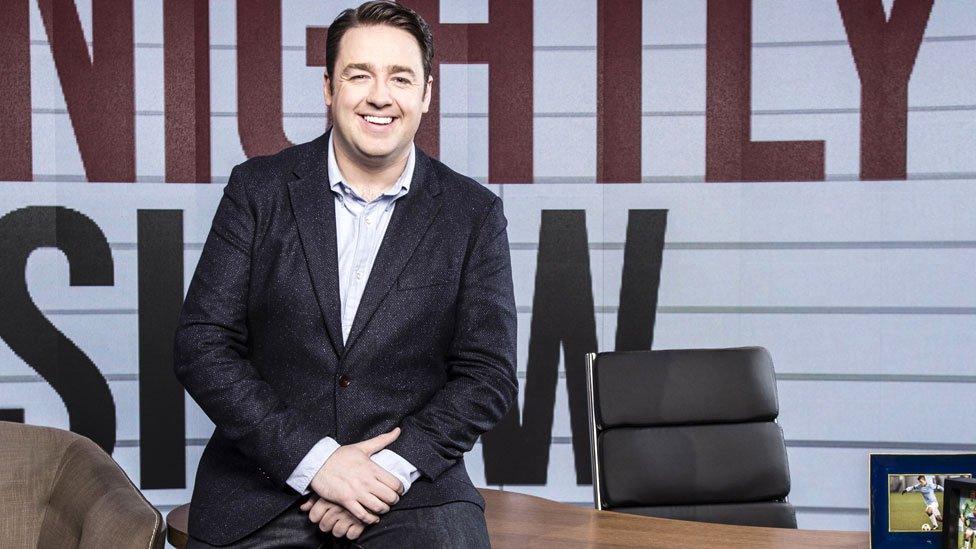
Jason Manford hosted the show in its penultimate week
ITV pushed the News at Ten back by half an hour to make room for The Nightly Show as part of the broadcaster's initiative to try out what it calls "Five Nights of New" schedule.
But, says Duthie, where The Nightly Show was concerned, it may have suffered due to its chosen timeslot. The most successful chat shows in the US start much later in the evening.
"In the UK we're much more conservative," she says. "By 10:30pm, peak time is over. But if a show is on later, you're catching people coming home from the pub late at night, and a lot of younger viewers."
She adds that part of the problem facing any new nightly entertainment show is the difference in audience expectation between the UK and the US.
'Knives are out'
"We've gotten so used to watching light-hearted entertainment shows on Friday and Saturdays that a lot of British viewers aren't used to upbeat, happy content on a Monday evening," Duthie says.
"Also, perhaps the networks wouldn't pay for original programming at 11:30pm in the UK - budgets are usually spent by about 10:30."
But she praised ITV for being willing to try something new in the first place: "As much as I love the News at Ten, it wasn't performing very well for ITV, so commercially it was a good decision to look at that 10 o'clock slot."
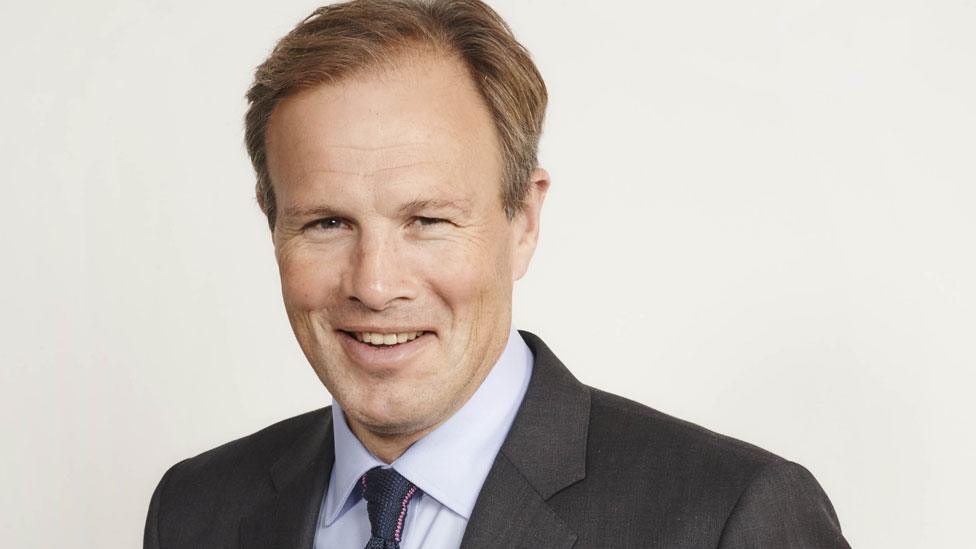
ITV pushed its evening news bulletin, fronted by Tom Bradby, back in the schedule
ITV's director of TV Kevin Lygo told Broadcast:, external "In terms of The Nightly Show, this eight-week run is about extending the 10pm hour, extending the primetime feel of ITV, and seeing how that looks and feels during this period and how viewers respond to something other than repeats, alongside the News.
"The intention was to make that hour feel a bit fresh and different with some stunt scheduling and I think we've done that.
"After the run has finished we'll obviously look at the shows and all the data and discuss what next.
"The broader point is - TV is a risk business, you need to try new things, and launch them with confidence and visibility to give them the best chance of success.
"And you've got keep doing that, and we will."

Social media presence
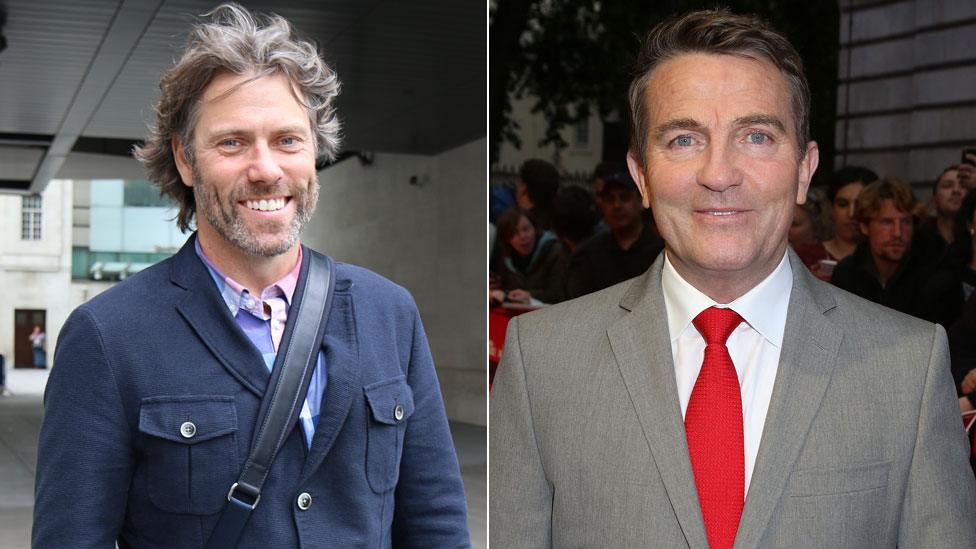
John Bishop and Bradley Walsh presented The Nightly Show during its run
US chat show hosts - from Ellen DeGeneres to Jimmy Fallon - now depend heavily on building a strong online following to match their viewing figures.
The Nightly Show had mixed fortunes on this front, with some segments not attracting many views, but others going viral worldwide.
At the time of writing, a compilation of Ramsay's best pranks during his week on the show has attracted 3.4 million views.
Fay Ripley giving parenting tips to John Bishop, in contrast, has had just a couple of hundred.
But while social media success can give a show a huge boost, it can also cause the problem of shows being judged too quickly.
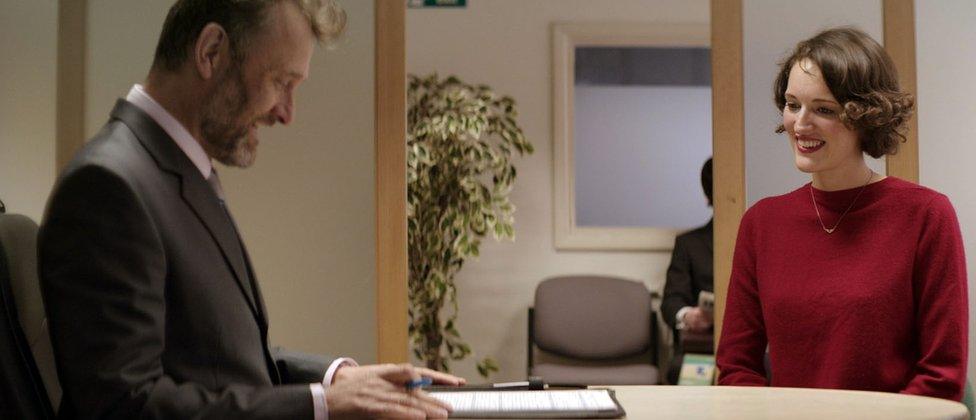
Fleabag's strong online following helped it build an audience
"Now you get such a snap decision with everything," says Taylor. "If something isn't immediately funny, you see people all over Twitter saying 'this is rubbish'.
"Social media can be great because you can build an audience for a show and make it an underground hit, like Fleabag.
"But conversely, when you've got something high profile that people don't enjoy, the knives are out.
"To some extent, all publicity is good publicity, but if a show can't breathe, it will put people off. Once that dies down, more people are likely to come to it naturally."
The ITV spokesman said the show's online clip performance had been "impressive, amassing more than 40 million views in total for its online content across various platforms, and more than 50,000 subscribers and followers".
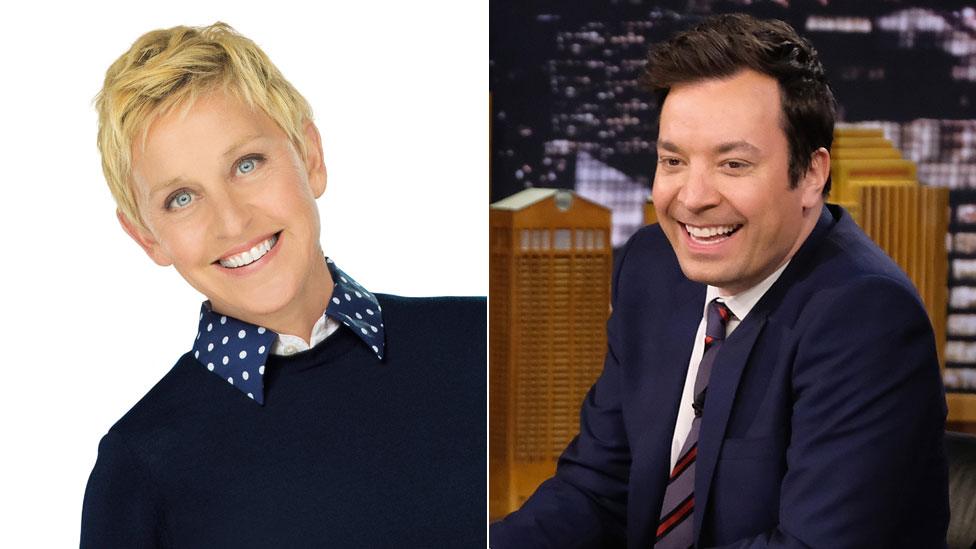
Ellen DeGeneres and Jimmy Fallon's US shows have a strong online presence
"The figures reflected the viral nature of the content. The John Legend/Gordon Ramsay sketch accrued more than 16.5 million views on Facebook. It was shared more than 310,000 times.
"The Gordon Ramsay Blender clip accrued over 4.3 million views on Facebook. It also trended at number one worldwide on YouTube for three days as well as accruing over 3.5 million views on YouTube."
The clip saw Ramsay pretend to cut his hand in a food blender, to the horror of the audience and guest Frank Skinner.
"It was the most talked about video on the Internet for the weekend of 1-2 April," ITV said.
As for The Nightly Show's future, ITV will now take some time to examine how the first series performed in more detail, before deciding whether to commission another.
ITV said: "We don't normally make decisions on recommissions until after a series has ended."
Whether it comes back in its current form or returns with a few tweaks, we could well be seeing much more of The Nightly Show in the future.

Follow us on Facebook, external, on Twitter @BBCNewsEnts, external, or on Instagram at bbcnewsents, external. If you have a story suggestion email entertainment.news@bbc.co.uk, external.
- Published7 March 2017
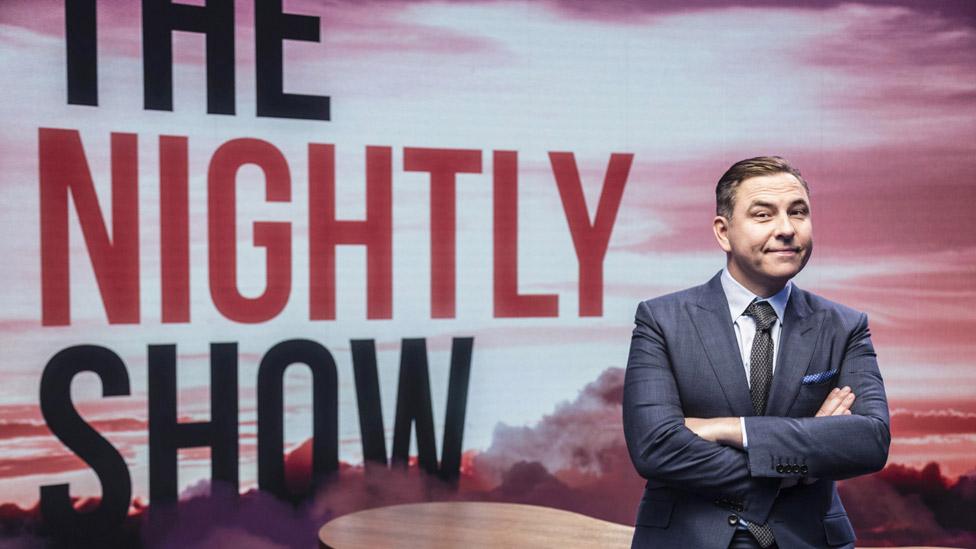
- Published25 April 2017

- Published9 March 2017
